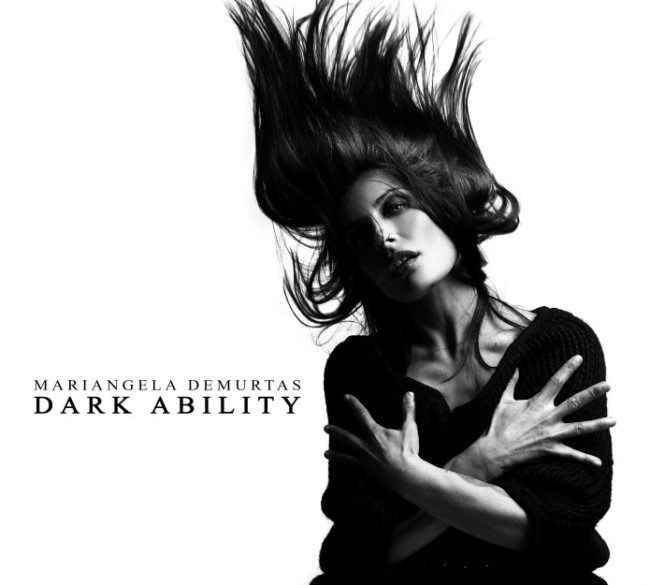
You can support Terra Relicta by donating! Please, do so, and thank you!

The renowned vocalist and songwriter Mariangela Demurtas is best known as the singer in the mighty Norwegian gothic metal pioneers Tristania since 2007. As a guest singer, she brought her beauty and attitude to such greats as Moonspell, Dark Tranquility or Orphaned Land, and later she formed, together with Italian guitarist Kris Laurent, the band Ardours, releasing an album and one EP. Recently Mariangela Demurtas presented herself as a solo artist and released the excruciatingly melancholic dark pop EP Dark Ability. The best way to know an artist like Mariangela Demurtas is to sit down and listen to her songs unfold around you. Mariangela discovered her vocal vocation as a child, in the proud island of Sardinia, where she’s originally from. Now she lives in Portugal, married to Ricardo Amorim (Moonspell), and has undertaken the most courageous and adventurous step in her career. Dark Ability is the first stone in the launch of her solo career (you can read the review of the EP over HERE). Her vocal gifts are now in places she has never been before, ready to expose her old and new fans to one of the most authentic talents in today’s atmospheric music scene. You must read this in-depth interview with Mariangela because she exposed many things about her new EP, solo career, herself, and her other music endeavours.
Interview with: Mariangela Demurtas
Conducted and edited by: Tomaz
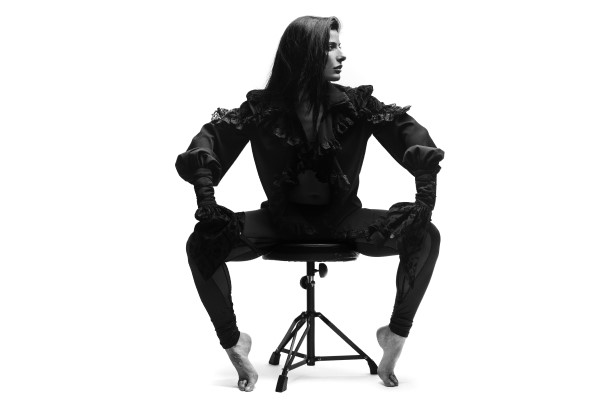 Tomaz: Hi Mariangela. Let's start the interview with an obvious question. Your first solo EP is here and is very different from what we were used to hearing from you?
Tomaz: Hi Mariangela. Let's start the interview with an obvious question. Your first solo EP is here and is very different from what we were used to hearing from you?
Mariangela: Well, it's not the first time that I write music alone. I mean, I've been writing songs since I was a kid. But I'd be I always had this dream of releasing something that meant a lot. In terms of like, opening up. I usually find writing with other artists very natural, but there was always something missing, it wasn't mine. In 2013 I recorded an album. That was mine, but I didn't release it because I wasn't still very sure about the direction. I always did music with others. So I didn't know. I didn't know how I wanted it to be sounding. Because of course, one thing is if you write the songs at home. And then you know, you leave them on the side. And then you just do music with your band. But your songs always stay there, you don't have an idea of how they have to sound. They're in your head so that you write them down, lyrics and voice. So basically, when I was 25, or 26, I noticed that my only skill was writing lyrics and singing them. And since I was always thinking like, okay, it's fun to write with others. But now I would like to write it by myself. I wrote it, something that is really me, mine. That said I started to improve my skills on guitar and piano. I started to study the instruments from scratch. When I was 28, I could play them and record them and sing them. So that's why I began to write songs. And then I said, ok, I want to release something on my own. Then 2013 came, and with all the challenges and difficulties, I was busy with my band, etc. I managed to finish it, but I wasn't sure if that was the way, I love the songs, but I didn't know if that was the way I want it to sound. So I gave myself more time. Meanwhile, I also wrote for Ardours, the band I created not long ago. Now I am a bit more confident about what I want to do. I don't care about others' opinions or fans' opinions or whatever. I mean, I care about the opinion of the fans, but not when they come for negative and unconstructive ones. I said to myself that this is the way I feel right now. And that's what I want to write about. So I took my old demos, and I took some melodies that I had already written before. And then I wrote this. The lyrics of Dark Ability are really into the moment that I was when I wrote them. I found myself writing the lyrics and completing the song in probably one of the worst times of my life. This is not because I need others to have some self-pity, or to think that the EP is gonna sound great only because of that. It's insane how I feel that my heart is involved for real honestly these songs. This is very unique. Because when you write songs just because you have to write an album, I mean, or you have music that you want to release, it's a harness, but it's not always something you are living in the moment. That was the case with the songs. I own, that it's in there. It was really felt. Some of it was painful, but it was felt. And that's what makes me very proud of it. I am so confident about the songs just because of that because they're harnessed, extremely harnessed. And also, because that moment inspired me. And I managed to go through a very hard moment. Making music was therapeutical, of course. And it meant a lot to be a musician at that moment. Otherwise, I don't know where I was going to be right now.
Tomaz: It happens many times that hard times produce great art. Tell me, were those songs completely done by yourself. Also, the instrumental part, or have you had some help?
Mariangela: Yeah, exactly. I recorded the songs at home with the piano and the guitar. I mean, I made the melody and the music in terms of notes. But then Daniel Cardoso of Anathema made all the instrumental parts like I wanted to have them. I didn't play the instruments on the EP, only on the demos, because I had to send him the music. So that's all I did. Daniel Cardoso also did the whole production of Dark Ability.
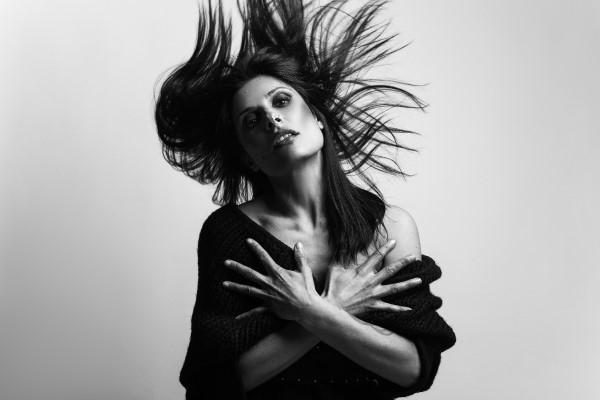 Tomaz: But weren't you working also with Daniel Cavanagh of Anathema?
Tomaz: But weren't you working also with Daniel Cavanagh of Anathema?
Mariangela: I wrote songs with Daniel Cavanagh, and those were released on my Patreon. So my patrons have the access to them. But that's something that comes from the past. I just wanted that to be available for listening. I think the songs are very cool. But yeah, those are songs that we wrote in a second. It means like we found ourselves jamming and we came up with songs.
Tomaz: The title of the EP Dark Ability shows something dark. As you said, you went through some dark times, but can you be a little bit more specific about what kind of dark times were you going through?
Mariangela: I cannot be extremely specific because it's something very personal, but it happened at some point in my family. I was diagnosed with something that would change my whole life. That's it. Yeah. It's not temporary, you know, it's something that will be forever, and that changed a lot of things in my life, personal perspectives, a lot of plans, a lot of things,... So I couldn't see any other thing other than that at the moment. It's been very dark, but the music saved me. Also, the thing that I had hoped for brought me to another level. The name of the EP is basically meant for release. If we go through hard times, it's not said the hard times come to harm us all the time. Sometimes they come for teaching us to be better people. So, this is the positive side of this darkness, and that's why I called it Dark Ability. Thanks to it I was becoming a better person and becoming a better human being, I give all the values in life and that's it.
Tomaz: Do you have any plans to promote the new EP also on the stage?
Mariangela: We are working on that but due to the pandemic, it was not easy to make any plans. That's my plan, but I have to see how it goes. Already with Ardours, I had the same problem. We launched the first album and then the EP of covers from the 80s, and then we had to stop. So we were just starting, and that's been a bit annoying. But anyway, you know, everybody in the music business went through the same.
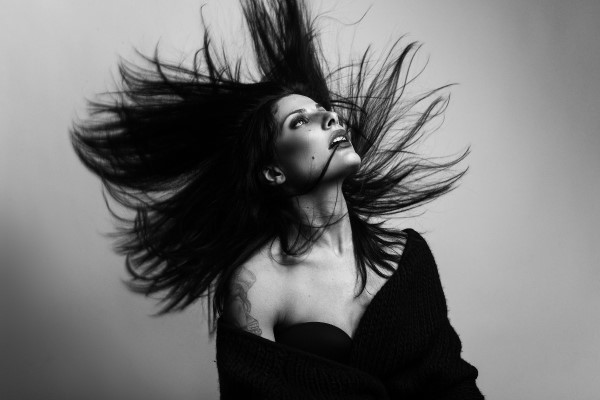 Tomaz: The EP is self-released. Was there any label interested to release it, or you didn't contact any?
Tomaz: The EP is self-released. Was there any label interested to release it, or you didn't contact any?
Mariangela: No, because I didn't send anything anyways to the labels. I didn't look out for labels, to be honest. Right now I want to see if it goes. Well, maybe I will think about that in the future. So let's see later. First of all, I just want the songs to be out there because I needed to scream. And then let's see. With labels, it can be also very, very stressful. And the last thing that I need right now is stress and business-oriented things.
Tomaz: As the first single you released "City", for which you also shoot a very cool video. Tell me more about the video, how it was working on it?
Mariangela: I can say that I've been working on the video for two evenings, full time, going back home at two o'clock in the morning after shooting. There was a lot to walk, and a lot to do, but it has been a lot of fun. It wasn't cold, so I was very grateful for the weather.
Tomaz: Because you said that in the past you wrote many songs, I guess that we can expect in the future more music from you, as a solo artist?
Mariangela: Yes, absolutely. Okay, for example, in my Patreon I already released 15 songs, original songs, and I just started Patreon around one year ago.
Tomaz: Now a different topic. What is going on with Tristania? There's such a silence about everything. Are you working on something new or did you put the band on hiatus? I hope that the band is not dead?
Mariangela: No, no, it's not dead. We talked about this, we're still talking about it. We have to combine the life of five or six different people, and sometimes it's not easy. We're all busy with our projects as well. So I don't know and I can't say anything. We are talking about coming back with something new. But yeah, I cannot promise anything, but don't worry, Tristania is not dead.
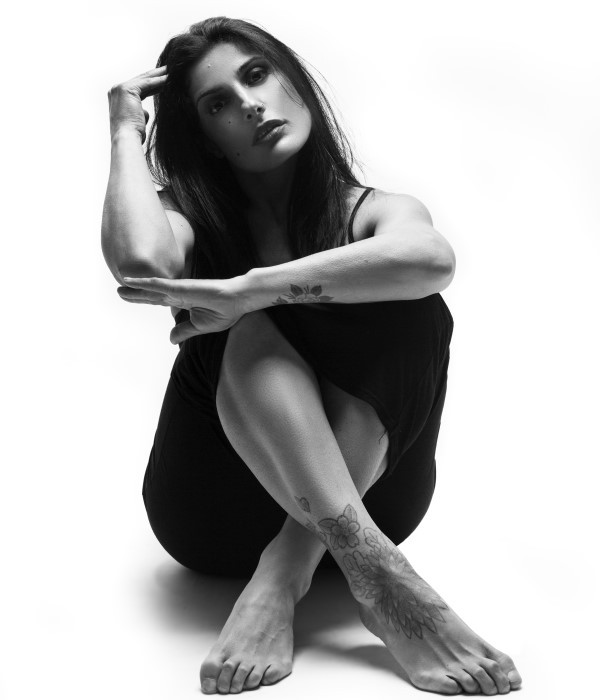 Tomaz: And what about your other band, Ardours? Is anything new coming up?
Tomaz: And what about your other band, Ardours? Is anything new coming up?
Mariangela: Yes, we are finally close to mastering the new album. It'll come out sometime later this year.
Tomaz: Great to hear that. I like a lot the first album, Last Place On Earth, but I still didn't hear the EP of covers from the 80s...
Mariangela: You really should listen to it because I pumped my voice a lot on those songs. We made metal covers or metal/rock covers of 80s songs, which is very cool. And funny.
Tomaz: I promise that. Let's go a little bit in the past of yours. If I'm not mistaken, you have joined Tristania in 2007. How was stepping in the position of Vibeke Stene? Did you feel any fear or something? How was it for you in general back then?
Mariangela: No, not at all. I always thought that we are so different and that we can't be compared. I wasn't afraid because I've been always very confident with who I am. I knew that I had something to say. So I said to myself that if some won't appreciate, then I will have others who'll like my style because I have my way, to be honest. I'm not going to go there and try to be Vibeke, you know, try to fill her shoes in a way that she did. It would be very stupid. So I just want to be myself because the band chose me for that, for being different.
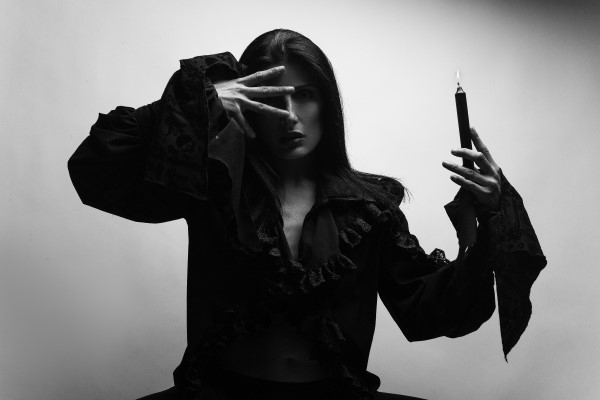 Tomaz: You worked with many different musicians. Is there a moment that you keep in your mind as something really special?
Tomaz: You worked with many different musicians. Is there a moment that you keep in your mind as something really special?
Mariangela: I mean, and that's not because I'm married to Ricardo (Moonspell), but Moonspell are the best band that I've been on stage with, that I've been dealing with and working within general. The thing about these guys is that they are very humble, respectful, very professional, hard-working, very good at what they do, and beautiful human beings. When I joined them for the first time, they tried everything to make me feel comfortable, making me feel welcome, respected me as a woman in that environment, and yeah, they showed a lot of love, affection and respect. They already called me sister after the first concert. I've been performing with them two or three times after that, and I and Ricardo were still ignoring each other, haha. I've never been disrespected. They are genuine and kind people. I didn't find this in any other band.
Tomaz: Yeah, I've met them quite some times, and were always very kind. Will you collaborate with Moonspell again on any of their upcoming songs?
Mariangela: I don't think that they need my voice anymore because I already did a lot with them. I did a lot of live shows with them, I also sing on their live DVD, and I recorded backing vocals for the 1755 album. I think that's enough. If you asked me about my husband, yes, we make music together, and it sounds great, but he never has enough time to do more on what we do, so we are making it and keeping it for fun. Everything that I do in the music I do it for myself. That's all.
Tomaz: And what did Ricardo say about your songs on the new EP Dark Ability?
Mariangela: My husband is totally in love with it. He even cried a couple of times while listening to it. He knows how much did it cost me working wise, and how much energy did I put into it, yeah, he knows. He truly loves it. He told me that he believes that I finally found my direction. He likes that Daniel did the instrumental part and gave me a lot of space for my voice, and he likes that my voice stands out as it does.
Tomaz: You are now divided between your solo stuff, Ardours and Tristania. Which one is the most important to you?
Mariangela: I would say my solo songs, no doubt about that. Still, that doesn't mean that I won't take time with other things that I'm committed to, like other bands, labels, etc. I always accomplish to do everything, no problem. My stuff is of course the music that touches my heart, it expresses me at my best.
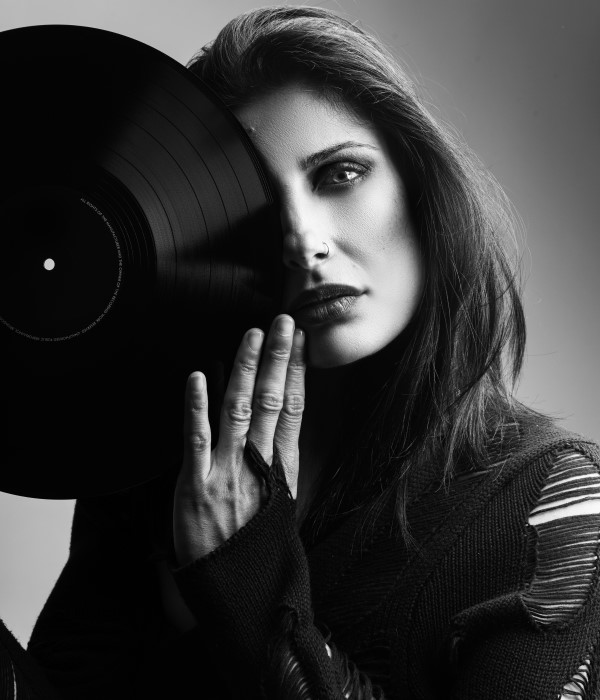 Tomaz: What gives you more satisfaction? To compose, record or play songs live?
Tomaz: What gives you more satisfaction? To compose, record or play songs live?
Mariangela: Uh, a difficult question. I think that all of them have their mood. When I'm writing it's a unique sensation but also very exhausting sometimes. When I'm performing, if there's a good sound, lights and everything, I would say yes, this is beautiful. When recording music, and if I'm feeling good, and if my voice is great, it's also a lot of fun doing it. There is a good and bad side to all of these processes. I like all of the three things, but it must be fine on all levels.
Tomaz: You performed live quite a lot, with various bands, but is there one show that you keep in your heart as the most special one ever?
Mariangela: I don't know, there were too many. Maybe later I will remember something but right now I can't say. There were so many special shows.
Tomaz: Ok, but do you prefer to play live at festivals or in smaller venues?
Mariangela: I think that both have a fascinating side. When I play at festivals, I like it when I see that open space, and everybody looks the same, so small from the stage, and it's cool. I feel quite easy to play like that. When I'm singing on stage in a small club, and I'm very close to people, it's an intimate thing, and it feels good. I don't know. I think that I like both things equally.
Tomaz: Before we end the interview. We talked about many things, but is there something you would like to add and I haven't asked you?
Mariangela: Oh, a nice question, really. Let me think. Why should people listen to Dark Ability? Because I found myself in a very strange time, and Tristania right now is not doing much. I think that many people are not following what we are doing because we don't show too much on the media as we did before. I must say that too many people are heavily influenced by the media, and they don't see anything else than that. They want to be influenced by image, fame, and similar stuff. I, on the other side, want people to listen to these songs, because I'm not there for fame or success, in a way like most are. I'm truly there to be myself, an artist that tries to share her feelings for others not to feel lonely, and to feel company in those moments when they have their hardest moments in life. I think that I'm at least doing something honest. It's sincere music, it's not made just because I want to make music and be there. This is something that comes from the heart. I'm trying to say that you should be there for the music and not the status. Go for honesty, nowadays there is too much-overproduced music, and there are so many repetitive things. Many think that you can make money with music, and all of them are trying to play the same music. Don't blame an artist just because he's doing a new thing, or if he's experiencing or travelling on another level because if it's honest, there's nothing you can judge. People should respect this thing about artists.
